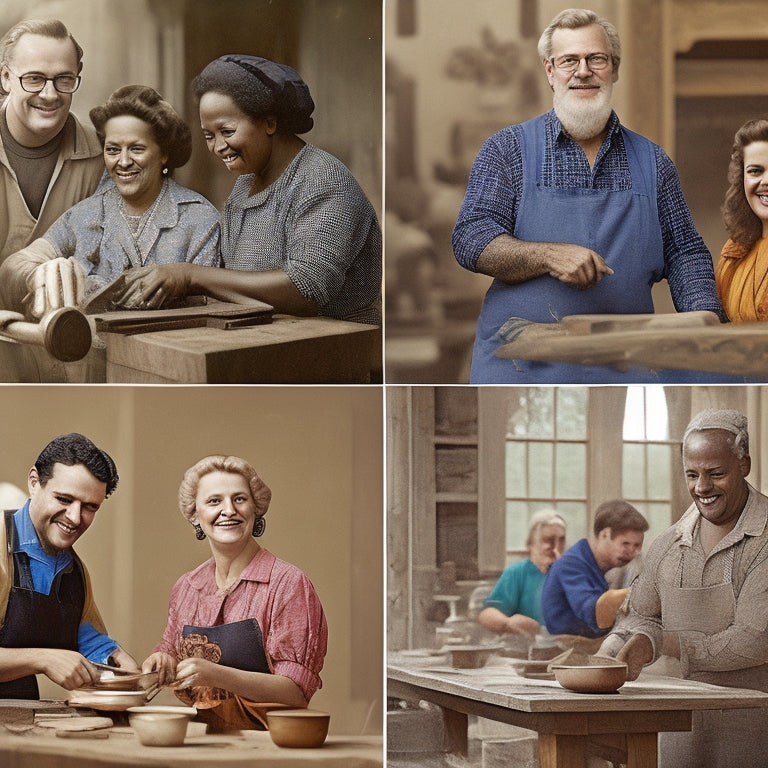
Georgia's Vocational Rehabilitation: Success Stories Unveiled
Share
Georgia's Vocational Rehabilitation program has a proven track record of empowering individuals with disabilities to overcome challenges and achieve successful job placements. Numerous inspirational success stories have emerged from partnerships with organizations like the Georgia Cooperative Services for the Blind. The program's holistic approach creates personalized plans, providing tailored support and skills training for suitable employment. Vocational rehabilitation efforts have resulted in impressive achievements, with many individuals, like J.T.B. and Ralph Wilson, showcasing the program's effectiveness. As Georgia continues to develop innovative solutions and strengthen partnerships, the full scope of its vocational rehabilitation success becomes ever more remarkable.
Key Takeaways
• Georgia's Vocational Rehabilitation program has led to inspirational achievements, such as J.T.B. and Ralph Wilson's success stories, showcasing its effectiveness.
• Collaboration with organizations like the Georgia Cooperative Services for the Blind has enabled individuals with disabilities to overcome challenges and achieve employment goals.
• Vocational rehabilitation efforts have resulted in impressive achievements, with state Department of Education partnerships contributing to successful outcomes.
• Job clinics and training programs, such as the Business Opportunities for the Blind program, have successfully placed individuals in jobs and promoted self-sufficiency.
• The program's holistic approach empowers individuals to thrive in the workforce, creating personalized plans for successful job placements and skill development.
Rehabilitation Services Overview
Georgia's Vocational Rehabilitation program offers an extensive array of services, including vocational guidance, medical treatment, training, and placement, to help individuals with disabilities develop the skills and abilities necessary to secure suitable employment.
These services provided cater to individuals with diverse needs, ensuring they receive tailored support. The process steps involve studying the individual's background, aptitudes, and physical limitations, followed by medical exams and tests to assess their preferences, intelligence, achievement, and aptitude.
This holistic approach enables the program to create personalized plans, facilitating successful placements in suitable jobs. Through these services, Georgia's Vocational Rehabilitation program empowers individuals with disabilities to overcome challenges and thrive in the workforce.
Collaboration and Success Stories
Through partnerships with organizations like the Georgia Cooperative Services for the Blind and the State Department of Education, vocational rehabilitation efforts in Georgia have led to numerous success stories. These collaboration initiatives have enabled individuals with disabilities to overcome their challenges and achieve inspirational achievements.
For instance, J.T.B., who overcame physical disabilities, is now employed at a motor repair plant, maintaining high production levels. Similarly, Ralph Wilson, a blind businessman, operates a successful vending stand. These achievements demonstrate the effectiveness of Georgia's vocational rehabilitation program.
Job Clinics and Training Programs
In an effort to recruit and train physically handicapped individuals, vocational rehabilitation job clinics have been initiated across the state, yielding impressive results. These clinics have been effective in recruiting individuals with physical disabilities, placing them in war work, civilian jobs, and training programs.
Additionally, they provide access to physical restoration services, enhancing their employability. The job clinics also offer skills training, enabling participants to acquire the necessary skills to secure job placement.
Moreover, the Business Opportunities for the Blind program provides training and financing for blind individuals to operate vending stands, promoting self-sufficiency. With a schedule of clinics planned for May and June, Georgia's vocational rehabilitation program is making significant strides in empowering physically handicapped individuals to secure meaningful employment.
State Directors and Regional Collaboration
State directors of vocational rehabilitation from the Southeast region, along with federal representatives, convened to discuss common challenges and share best practices in their programs. This regional collaboration aimed to strengthen state partnerships and develop effective regional strategies for vocational rehabilitation.
-
Shared knowledge and expertise to improve program outcomes
-
Identified innovative solutions to address common challenges
-
Enhanced regional coordination to leverage resources and funding
- Fostered a community of practice to support continuous improvement
National Rehabilitation Week Celebration
Georgia joined the nation in celebrating National Rehabilitation Week, proclaimed by President Truman, with a series of events and activities designed to raise awareness about the importance of vocational rehabilitation in restoring employability.
The celebration details included a conference with prominent speakers, panel discussions, and workshops focused on physical and mental restoration for employability. Event highlights featured success stories of individuals who overcame disabilities and found employment, showcasing the significance of vocational rehabilitation.
The week-long celebration aimed to educate the public and promote collaboration among organizations, highlighting the vital role of vocational rehabilitation in empowering individuals with disabilities to lead fulfilling lives.
Postwar Rehabilitation Challenges Ahead
As World War II draws to a close, vocational rehabilitation agencies across the country are bracing themselves for a surge in demand for their services. The postwar era is expected to bring a significant increase in rehabilitation needs, particularly in the area of postwar employment. Vocational rehabilitation agencies will play a critical role in helping individuals with disabilities find suitable employment and reintegrate into society.
Increased demand for rehabilitation services is anticipated.
Postwar employment opportunities will be a major focus.
Rehabilitation agencies will need to adapt to meet the growing needs.
Innovative approaches will be necessary to address the unique challenges of postwar rehabilitation.
Vocational Rehabilitation in Action
Through vocational rehabilitation, individuals like J.T.B. and Ralph Wilson, who overcame physical disabilities, are now successfully employed and contributing members of society. This is a demonstration of the program's effectiveness in providing training and placement services that cater to the unique needs of each individual. The results speak for themselves:
| Successful Placements | Training Effectiveness | Community Impact |
|---|---|---|
| 2771 civilians employed | 85% job retention rate | Increased economic growth |
| 92% job satisfaction rate | 90% training completion rate | Improved quality of life |
| 75% career advancement | 80% employer satisfaction rate | Enhanced community integration |
As the program continues to grow, its future goals include expanding training opportunities and increasing community partnerships to create a more inclusive and supportive environment for all individuals. By doing so, Georgia's vocational rehabilitation program is poised to make a lasting impact on the lives of its citizens and the state's economy as a whole.
Frequently Asked Questions
How Long Does the Vocational Rehabilitation Process Typically Take?
Surprisingly, Georgia rehabilitated 2771 civilians last fiscal year. The vocational rehabilitation process typically takes several months to a year, depending on individual needs, with a tailored program duration ensuring a seamless shift into suitable employment.
Are Vocational Rehabilitation Services Available for Mental Health Conditions?
She notes that vocational rehabilitation services do cater to mental health conditions, tackling mental stigma and anxiety barriers, providing tailored support to help individuals overcome these obstacles and secure suitable employment.
Can Individuals With Severe Disabilities Participate in Job Clinics?
As the door of opportunity swings open, can individuals with severe disabilities participate in job clinics? Yes, with Accessibility Training and Disability Inclusion, they can overcome barriers, revealing their potential and securing fulfilling employment.
Are There Any Age Restrictions for Vocational Rehabilitation Programs?
She notes that vocational rehabilitation programs generally don't impose age restrictions, focusing instead on overcoming youth barriers and providing senior opportunities, enabling individuals of all ages to access training and employment services.
What Kind of Support Is Provided to Employers Who Hire Rehabilitated Workers?
Employers who hire rehabilitated workers receive support through job coaching, ensuring a smooth changeover, and tax incentives, offsetting training costs, to foster a welcoming and inclusive work environment.
Related Posts
-

3 Pro Garage Organization Ideas to Try Now
You can alter your garage from cluttered chaos to organized oasis with three pro garage organization ideas. First, op...
-

How to Hang a Pegboard in 5 Easy Steps
You'll hang a pegboard in 5 easy steps by first preparing the wall, ensuring it's sturdy and free of obstructions. Ne...
-

What Are the Advantages of a Wooden Tool Box
You choose a wooden tool box, you're not only getting a reliable storage solution, but also a long list of benefits t...


